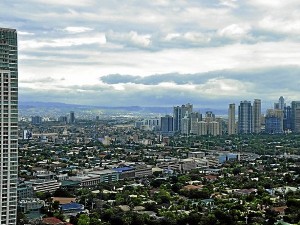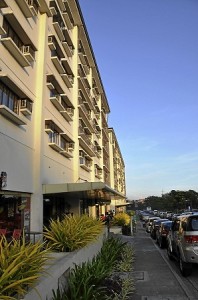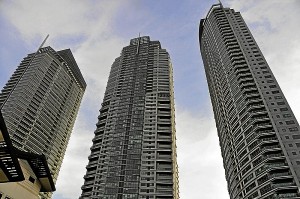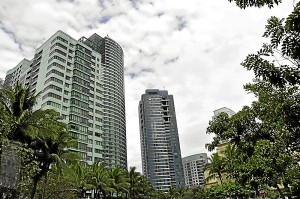Condo-buying experience depends on agents, developers

RESEARCH and investigate to find an affordable and trouble-free condominium unit near your workplace.. PHOTO BY TESSA R. SALAZAR
(Conclusion)
The past two weeks, Inquirer Property has enumerated the eight most common complaints of buyers of Philippine condominiums. Now, we ask the property experts and analysts: Do these rants have basis? The unanimous response seems to be in the affirmative.
“Yes, a significant component (of the condominium business) comes from the most neglected part of the development phase—the post sales and service delivery process. Developers look at this phase as ministerial and an added cost. So they end up using poorly trained frontliners and account managers employing archaic methods that breed bureaucracy. This can be a recipe for a higher attrition rate,” analyzed Enrique M. Soriano, Ateneo program director for real estate and senior adviser for Wong+Bernstein Business Advisory.
Soriano added that buyers must read and understand the Reservation Agreements (RA). They must also make sure that they take the initiative in monitoring their deposits and downpayments. Agents, he noted, come and go, and it would be hard
to rely on agents and developers’ representatives to provide the servicing when there are thousands of units being processed.
“Real estate buying should never be an emotional decision, and it pays to do extensive research not only on projects but on the track record of the developer. That includes doing a full check on agents and brokers,” he said.
Soriano added that buyers must ask these questions: Is the agent an organic part of the property firm? Is he/she an accredited broker? Is he/she on full time with property brokering or with the development?
He also urged buyers to ask to meet with the most senior head of the sales organization so you can have the assurance of a fair deal.
National Real Estate Association chairman Alejandro S. Mañalac, for his part, said: “Basically, it all boils down to the choice of company and choice of agents.”
He advised buyers to be wary of deals with new agents with no real estate experience. He said that buyer security would “hopefully improve with the strict implementation of the RESA [Real Estate Service Act] law requiring PRC licenses for brokers and accreditation for agents.”
Stress-free buying experience

YOU still need to do your homework when buying a condo unit near your workplace. PHOTO BY TESSA R. SALAZAR
Paul Vincent Chua, Colliers International associate director for valuation and advisory services and head of consultancy and research, said that with the amount of units being sold in the market these days, “what separates a good developer from one that is not is the quality of their agents.”
“One of the primary responsibilities of the agent is to make sure that the buying experience of their client is as stress-free as possible. That is the reason people go through agents anyway. Now, if the agent does not explain properly the requirements or the timelines needed to process the documents needed to complete the reservation, then the agent is at fault.”
Chua added that “buyers must be fully informed and it is their right to be informed. If the agent cannot answer your questions, particularly on the documents, then you have the right to request for a different agent or talk with your agent’s superior. It is their money and they have that right. You have to have everything documented (official receipts are issued, etc.)”
Veteran broker and real estate educator Enrico S. Cruz also agreed that most of the complaints have basis.
“I have been receiving information on these unfortunate situations. The usual case is where the buyer signified something verbally and not in black and white with the ‘agent’ (who should be called a real estate salesperson) or to the developer who initially agreed but later on denied.”
- IT would be best to deal only with reputable developers when buying a unit, whether you’re an overseas Filipino or not. PHOTO BY TESSA R. SALAZAR
Cruz said buyers should be advised to make all their communications with the developer or salespersons in written form, and properly received by them. As much as possible, he said, buyers should directly
communicate with the developer.
Careful
Buyers should be careful to read and fully understand the contents of all the documents they sign, specially the fine print. Buyers should also demand any explanation or replies to be made in writing.
Cruz said double sales are prohibited. Pesidential Decree 957 requires developers to register all sales made, even if on installment, with the Register of Deeds. Even though with this requirement, buyers should first verify the Transfer Certificate of Title or Condominium Certificate of Title before buying any property, if it is clear of any annotation of previous sale or mortgage.
- REAL estate buying should never be an emotional decision, and it pays to do extensive research not only on projects but on the track record of the developer. PHOTO BY TESSA R. SALAZAR
Cruz said that upon deposit or payment of down payment and signing of the Contract to Sell, buyers should take the initiative of registering the sale with the Register of Deeds. This will prevent the seller from making a second sale of the same property, or if ever there is a second buyer, the first buyer who registered the sale has the right over the property.
LGUs, HLURB
Chua said buyers should understand that prior to any condominium launched, it must be approved by the local government unit and the Housing and Land Use Regulatory Board—two government agencies that should be able to identify based on their zoning plan the areas where residential buildings should be built. “Admittedly, some of our land-use plans are outdated and should be studied by the local government again, to ensure the safety of the would-be buyers in these developments,” Chua added.
Soriano said that in his engagements in other Asian countries, developer initiatives provide prospective homebuyers with a neighborhood directory that provides a detailed natural history of the area, contact information of local officials, support institutions like schools and hospitals as well as destination landmarks.
“This handy information provides a ready reference that includes disclosure notes. The material provides prospective home buyers information before and after the selling process,” Soriano concluded.


